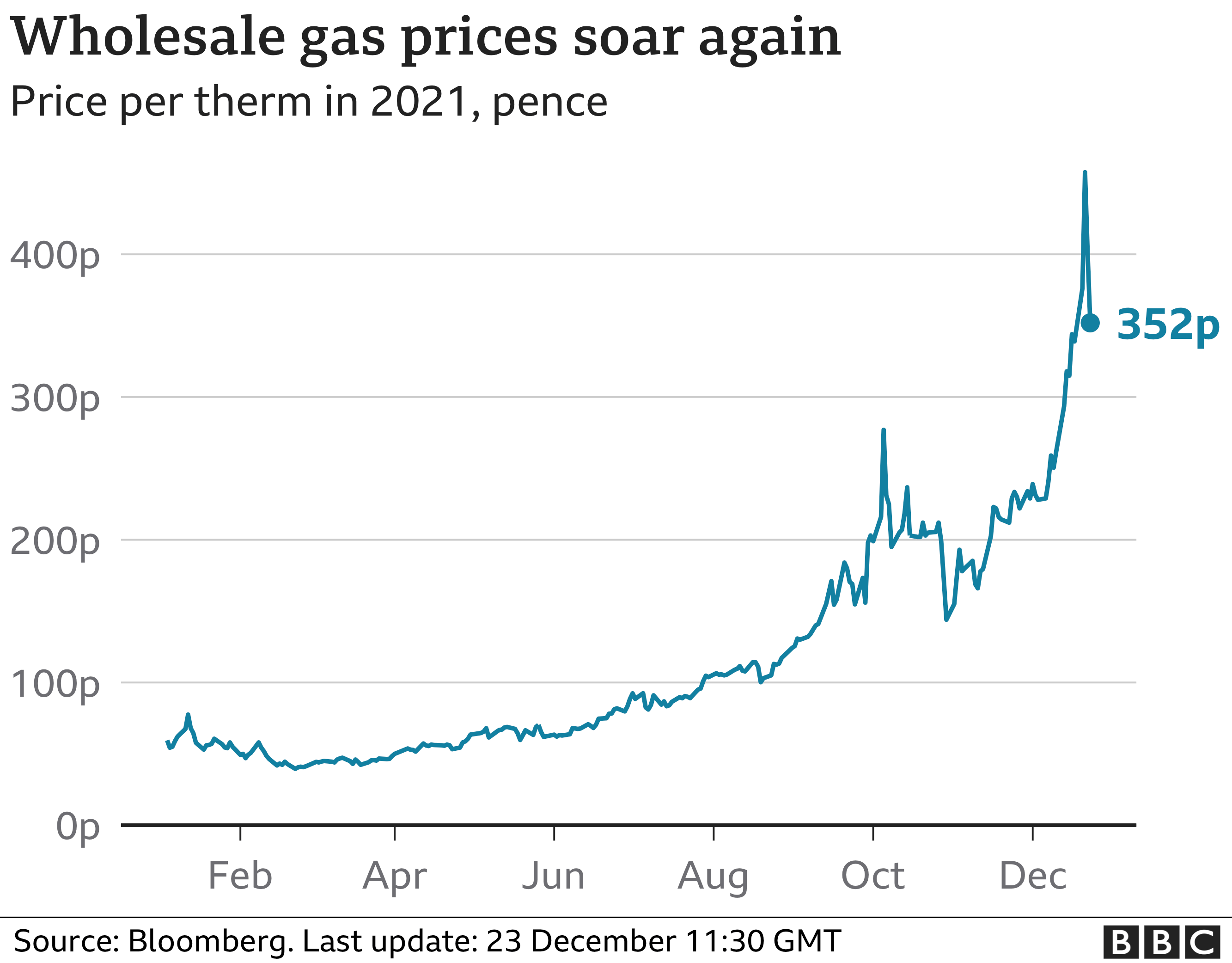Households face another sharp rise unless the government intervenes to ease the impact of gas prices.

Image source, Getty Images
Energy bills will soar another 50% next year unless the government intervenes, the industry has warned.
Supplier EDF said the situation was “critical” as customers, already seeing record bills, are hit with more rises due to surging wholesale gas prices.
Emma Pinchbeck, head of trade body UKEnergy, said rising prices were now starting to hurt the economy.
She told the BBC the Treasury could ease taxes and green levies, as some other governments in Europe had done.
“We’ve had record-breaking gas prices since September, and over the last couple of weeks prices have spiked again,” she said. “They are at levels that, frankly, we have not seen before.
“It’s looking pretty serious for the spring. Domestic energy bills are going to go up 45-50%.”
Wholesale costs hit another record this week of 450p a therm, which experts predict could take average annual bills to about £2,000 next year.
Economic damage
Ms Pinchbeck said that across Europe, governments are asking energy-intensive commercial users to turn down factories in order to make savings and ease the knock-on impact.
“We are asking our Treasury to intervene as other governments have. When it comes to bills, it’s worth remembering that less than a fifth is in the control of suppliers,” she said.

Many other governments across Europe have reduced taxes and other levies, and similar action could save close to £200 a year on an average bill, she said.
“The price is now so high that this affects the whole of the economy. So does the Treasury need to do more? They have been reluctant to intervene so far in the bits that are within their control,” she said.
Philippe Commaret, a managing director at EDF, the UK’s fourth-biggest supplier, said: “We urge government to act now to support energy customers. The situation is critical this winter and unfortunately, this is only the beginning.
“The increase in the price cap in April could be as much as £700, and by next October, the cap could easily exceed £2,000 – that is, twice as much as the levels seen last winter.”


If you think your gas and electricity bills are high now – just wait. That’s the message coming from the energy industry.
The cost of gas on the wholesale markets – where providers buy what they need – has been rocketing in recent weeks. It has more than doubled since early November.
A swathe of suppliers has already gone out of business as a result. Ofgem can hold back the tide for vulnerable consumers for a bit with its price cap – but it is just delaying the inevitable. Even capped bills will rise dramatically next year.
The problem is, the market simply wasn’t designed to deal with this kind of situation. That’s why calls for the government to step in are growing louder by the day.

Consumers have been shielded from the full increase in wholesale costs by the price cap, a limit on domestic rises set by the regulator Ofgem. The cap is next due to change in April.
Many in the industry blame the cap for problems in the sector. More than two dozen energy suppliers have gone bust since the start of September, putting thousands of people out of work and leaving millions of homes in limbo as they wait for a new supplier.
These failed firms include Bulb Energy, with 1.7 million customers and which because of its size was put “special administration”, where it is run by Ofgem.
The cap is set every six months. As gas prices have soared this year, it has forced suppliers to provide energy to households at eye-watering losses.
Industry regulator Ofgem has proposed a series of short and long-term solutions to the issues that the price cap causes in extreme circumstances.
These include reviewing the price cap every three months or overhauling it in favour of a six-month fixed tariff.
Last week, the governor of the Bank of England warned that a recent further spike in wholesale gas prices would help drive UK inflation to about 6% early next year. The inflation rate is already at a 10-year high of 5.1%.
The BBC has asked the Treasury for comment.